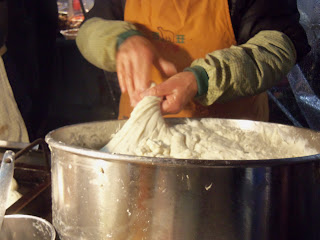Hospitality is hard work and hard work is usually what I excel at. I don’t have particularly good footskills or natural violining talent, but in both soccer and music, you can cover a lot of weaknesses with hard work. I’m a natural worker—a “strong back, weak mind,” as the saying goes. It’s something my dad says, anyway.
 |
| On the way to Oryukdo |
Speaking of my dad, he was here, in Korea, with my mom. Seriously. In the APA style manual it instructs writers that italics are not to be used for emphasis because if the emphasis is important enough to press “CTRL i” you ought to just rewrite it so it sounds better. You should try not to suck too hard as a writer and avoid using italics the way your Korean students abuse exclamation marks.[1] I’ve tried, but I’m not really sure how to write the first sentence of this paragraph emphatically so as to render the italics useless. Attempts at this topic sentence:
· After seven months of skype dates, I finally saw my parents at Gimhae Airport six days ago.
· My dad and mom were in Korea, having come approximately 14 time zones in the future and 6,500 miles away from their normal lives to the other side of the world.
· My parents spent their spring break trooping up and down mountains and stairs and subways in order to be with me.
· I love my parents.
I’m sticking with italics.
My parents were here, in Busan, at my school, by the bus stop, in coffee shops, on the subway, up the mountain (down the mountain, up and down, up and down), attending my classes, sleeping in my time zone, eating Korean food, living Korean life with me. They also brought Golden Grahams, girl scout cookies, my camera, and my T.S. Eliot (quotes surely to follow). They brought hugs. They brought two sets of eye crinkles, smiles, and senses of humor that I inherited.
 |
| What is this kimchi business? |
With them came distant memories of home and childhood—random memories, like the time dad put in a basketball hoop for my sister’s birthday—and the more recent memories of coming to Korea. I wrote once about forgetting what was novel because I was already so acclimated. But as my parents patted the ridiculously hard bed, laughed at sticker photos, and got groped by old ladies on the subway, I remembered my own transition.
“Never would have thought to accelerate down the hill,” my dad remarked breathlessly to my mom as our taxi careened through down a 35% grade slope and jerked a right turn at full speed—narrowly missing a calm female pedestrian talking on her cell phone. Mom laughed and asked when we could eat kimbap again. “It’s like a turkey sandwich! I’d eat it every day back home for lunch.”
That was the first day. When even my mom—whose exploits in the gym are memorialized in this post—mentioned her calves were sore, I remembered my own first-week woes of constant stairs and mountains. My legs don’t feel a thing anymore, just like I hardly notice the insanely dangerous cab-driving and how I can actually remember the names for food the way I never could for the first month or so.
Not everything from their visit was about old memories, though. There were some beautiful firsts like doing sticker photos with my parents (Dad: “Am I…being punished for something?”) and watching them try kimchi, bibimbap, bulgogidapbap, kimbap, samgyetang, hoddeok, and galbi. My parents are hardy folks, though, and I think I experienced more culture shock than they did as I ordered the food, gave directions, and generally played hostess.
 |
| Being cute at Gwangali |
You see, I’m a grown-up. I have a job and an apartment and a life away from home. I know the area, the food, the language in a way my parents never will. It’s bizarre and appropriate, somehow. It’s like that part in all the books I read growing up when the hero comes back home—riding on their dragon steed/friend, wearing a sword she attained through destiny, and noticing that everything in the Shire looks smaller than they remembered.
My parents are pretty short[2] and our ice-cream scooper, though mammoth, is not as heavy as my six-year-old mind paints it—and I’ve known this for a while. I suspect I’ll marvel at my adult status until I’m thirty or so, but there’s something about the hard work of hospitality that acts as a crucible of maturity. My mom always told me that she didn’t realize how selfish she was until she had children to raise. Showing my parents are Busan was, I imagine, a lot more enjoyable than giving birth and neither of them woke me up crying in the middle of the night asking for food.
 |
| Haeundae Beach |
I was responsible for my parents this week for the first time ever as their host here in Busan. I didn’t do anything spectacular—found food, recharged bus passes, and generally figured out how to be a tourist in my hometown with a grand total of six words in Korean. On one occasion I failed completely—no Lotte baseball for us—and another went about four subway stops in the wrong direction right after my mom commented on how well I knew my way around. It’s hard work, hospitality. It takes more than a “strong back, weak mind” to do. You need strong calves and advanced googling techniques. You need to be able to say “kosin tehakyo ga jusyo” and read menus in hangul. But it is so, so worth it.
(For the record, my parents own more than one outfit each, but they're both economical packers. I think my mom would want me to include that. Probably my dad, too.)


















